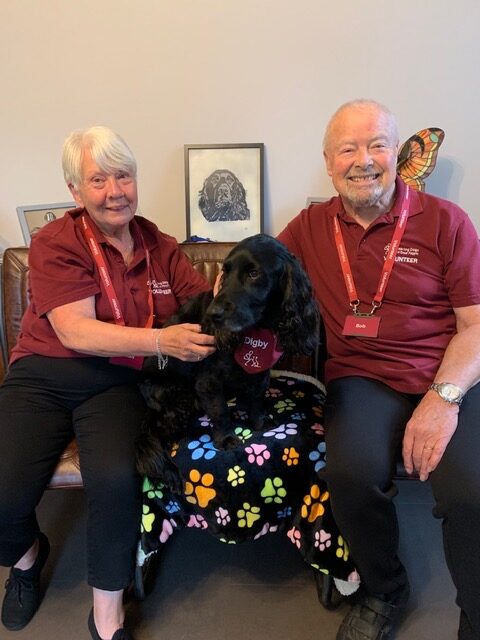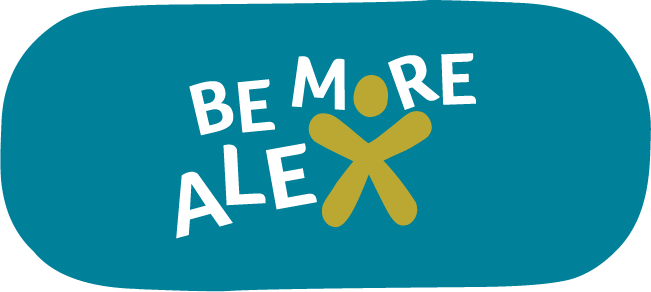
Sunday Spotlight – Meet ‘Team Swepstone’
October 27, 2023 11:09 amFor those that don’t know you, how would you describe yourself and your situation?
I was diagnosed with Meniere’s Disease 20 years ago, and over that time have had to deal with violent vertigo attacks and progressive hearing loss in both ears.
My life as I knew it slowly eroded until I no longer wanted to socialise; even trying to communicate with family became hard. I couldn’t use a phone or hear the TV for a long time. A couple of years ago I was given Bluetooth hearing aids which really helped – I could speak to my children on the phone and hear the TV through a streamer.
Sadly, my hearing has deteriorated further, and I’ve developed Hyperacusis which makes all sounds distorted so I can no longer use the phone and have to use subtitles on the TV again. I find it difficult in social situations and rely on Bob, my husband to help me when I don’t understand what people are saying.
What’s your life been like dealing with your condition?
I’ve spent weeks at a time confined to the house due to the vertigo attacks which can actually throw me to the floor. The illness is constantly changing and I’ve had to face different challenges.
It affects my balance and at times even walking down the street I walk as if I’m drunk. I daren’t go out alone after dark as my balance is even worse. I’ve suffered a few injuries because of it.
What’s been the most difficult moment?
My most difficult moment was when I had my first violent vertigo attack. It happened in the canteen at work with no prior warning, in front of colleagues. I was too embarrassed to talk about it afterwards. I couldn’t understand what was happening to me and found it terrifying.
What effect has your illness had on your mental health?
From 2003 my mental health was in serious decline. I was finding it an uphill battle to keep my job. My deteriorating hearing made things worse as the illness progressed.
I’ve gone from being a ‘normal’ woman doing normal activities to someone who can’t even tell what her own husband is saying unless he slows his speech so I can lip-read him. I’ve had counselling for my mental health.
How did your diagnosis change your daily life?
My workplace undertook an Access-to-Work exercise which identified the equipment I needed to be able to do my job. I was taken out of my management role and moved, with my consent, to a depot down the road from where I lived. This made it easier to get home should an attack occur.
I had to be strong as my employer wasn’t supportive in the early stages, and I feared I’d lose my job – despite having worked there for over 43 years. It was only when my doctor informed my employer that I was covered under the Disability Discrimination Act that I felt any sense of reassurance.
At home, Bob was supportive when I was ill and took over running the household. It helped that we were able to buy equipment to help me to hear better.
You’re now proactive in the hearing loss community and helping other people in similar situations. How did this become part of your journey?
Once Meniere’s Disease has destroyed your hearing, the vertigo attacks become less, so hearing loss becomes the main issue. We began researching ways of managing my deafness and in 2015 came across the charity ‘Hearing Dogs for Deaf People’ (HDfDP). We both thought what a marvellous thing this was, as it offered independence and companionship for those affected by profound hearing loss. We both became volunteers from then on.
In 2018, we realised that I needed extra help to cope on my own in the house when Bob was out. I applied to the charity in 2018 and was matched with Digby who came to live with us in January 2021.
It was a life-changing moment for me: I hadn’t been able to ‘hear’ anyone at the door for seven years before I had Digby, my Hearing Dog! Since having him, I’ve met other HD recipients and we’ve formed the South Derbyshire Fundraising Group.
For those that don’t know about your work, how would you describe your mission?
Once I was matched with Digby and we realised what a tremendous asset these dogs were to deaf people, we knew we had to get the message out there. HDfDP does not get any government funding whatsoever, so donations are vital to keep the charity going.
Bob and I continue to support the charity’s work through a range of activities. We currently sponsor a puppy through its training; we work at fundraising events arranged by HDfDP; we put on fundraising events ourselves; plus, we give presentations.
We don’t take any money from the donations for travel expenses etc. We bear the cost ourselves as every penny counts towards providing the hearing dogs.
Many people find that optimism and positivity are key coping mechanisms. How have you manged to remain positive in difficult situations?
I suppose being a stubborn Taurean and not wanting MD to get the better of me has given me the strength I didn’t think I had before all this. Bob and Digby are my two main support mechanisms.
My husband has been with me every step of my journey and I couldn’t cope without him or my dog. I’m at the stage where I’m struggling to understand what people say so Bob’s help is even more important because I can lip-read him easily.
That’s how we manage the presentations; I present, Bob relays questions from the audience to me and Digby sits there looking cute. We’re Team Swepstone.
Tell us more about working with hearing link/Hearing Dogs for Deaf People.
Bob and I actively approach supermarkets, shopping centres, and businesses to request permission to do collection days on behalf of the charity. We provide literature for people to take away and answer any questions they have about Hearing Link and HDfDP.
We also work with large organisations like Pets at Home which collect donations on our behalf at certain times. This year Matlock Golf Club chose us as its 2023 charity; Digby is the club’s Ambassador HD.
I used to be on the committee of a Derby-based charity for deaf people which helps with re-tubing, equipment and advice. I had to resign as a committee member as my work for HDfDP became more time-consuming but I still volunteer for them.
What does the future hold for you to #BeMoreAlex?
The future holds for us the chance to expand our fundraising activities even further. We’ll continue to seek new opportunities to reach more people and in so doing, raise more money and greater awareness of what HDfDP achieves. We want everyone to know what these amazing dogs can do, ensuring ‘deaf people leave loneliness behind’.

Posted in Sunday Spotlight

